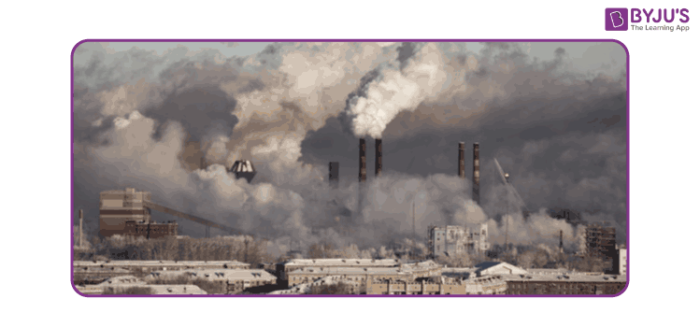What are Fossil Fuels?
The substances which act as energy sources are known as fuels. The buried organic matters which can be converted to crude oil, coal, natural gas or any heavy oils by applying pressure and heat to the earth’s crust over hundreds of years are known as fossil fuels. This topic educates about the effect of burning fossil fuels on the environment.
- A good fuel is one which is readily available at a cheap rate and produces a moderate amount of heat on burning.
- The amount of energy produced by 1 kilogram of fuel is known as its calorific value.
- A fuel which burns completely in the air at a moderate rate and produces a large amount of energy is known as an ideal fuel.
- No fuel has such properties and hence ideal fuel is not easy to obtain.

The Effect of Burning Fuels on the Environment
Effects of fossil fuels on the environment:
The burning of fossil fuels leads to the release of harmful products into the environment. An increase in the consumption of fuel leads to harmful effects on the environment. The following points will clearly depict these effects:
- Carbon fuels such as wood, coal, and petroleum release unburnt carbon particles into the environment. These particles are very dangerous pollutants and cause respiratory diseases for example asthma.
- When fuels are incompletely burnt, they release carbon monoxide gas into the atmosphere. This gas is very dangerous as it is poisonous in nature. If we burn coal in a closed room, then the person sleeping in that room will be killed by the action of carbon monoxide.
- The combustion of fossil fuels also releases a large amount of carbon dioxide into the atmosphere. Carbon dioxide is a greenhouse gas which is responsible for global warming. Global warming is a rise in the overall temperature of the earth’s surface. This leads to the melting of polar caps and a rise in the sea level and further results in flooding of coastal regions.
- The burning of coal and diesel releases sulphur dioxide gas. This gas is extremely corrosive and suffocating in nature. Petrol gives off oxides of nitrogen. The oxides of sulphur and nitrogen get dissolved in rainwater and form acids. This is known as acid rain. This water is very harmful to plants, animals, and various monuments.
Nowadays these fuels are being replaced by CNG (compressed natural gas) because it is a cleaner fuel and produces less harmful products.

Satellite image of China covered by smog

This article briefly describes the harmful effects of burning fuels. For any further query on this topic, register with BYJU’S and install BYJU’S – The Learning App.

Very helpful for me
I have learnt many from this.used for me
Very helpful in understanding the fossil fuel and its impact.